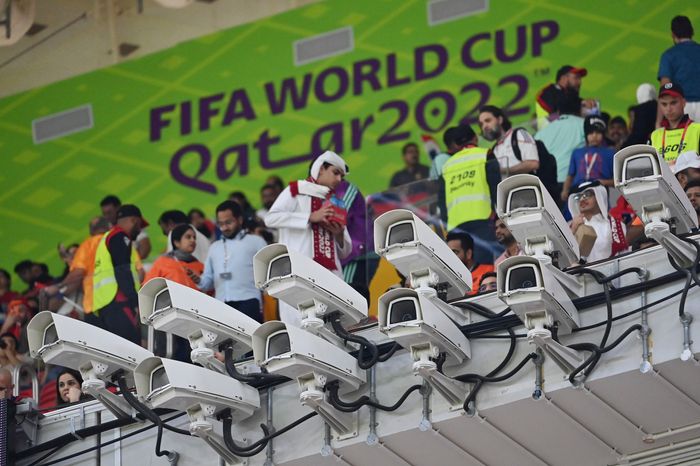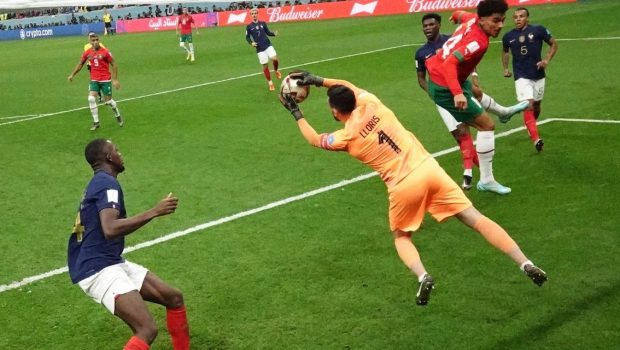Soccer Technology Raises Privacy Risks for Players
The World Cup tournament is the largest stage for new technology in soccer, but players’ unions say the sport lacks clear rules on the use of athletes’ data.
This year’s World Cup, which ends Sunday when Argentina and France face off in a final match, features new technology to collect players’ data. At each stadium in Qatar, 12 cameras using 4D optical tracking and a sensor in the soccer ball collect information from 29 points on players’ bodies to help referees make quick, semi-automated decisions in all games during the monthlong tournament that began Nov. 20.
FIFA said it started testing the technology in 2021 to cut the average time of 70 seconds that it takes referees to decide if a player was offside. The data isn’t out yet on whether the tech saved any time in this year’s tournament.
“It’s the most technological football World Cup ever,” said Jorge Oliveira e Carmo, FIFA’s head of data protection, speaking at a conference in Brussels last month. FIFA isn’t only soccer’s global governing body, it is also a sports and entertainment company that creates apps and services to share with fans, Mr. Carmo said. “It’s important for us that we do see privacy as a business enabler,” he said.
Soccer clubs, data analytics companies, betting firms and players themselves may want to earn money from athletes’ data, but information collected from their bodies comes with privacy risks.
“The risks already exist, but they will increase. [There is] a very fine line [between] risks and opportunities,” said Jonas Baer-Hoffmann, general secretary of FIFPRO, the trade union that represents professional soccer players around the world.
Across the sports world, the technologies that are being deployed to analyze and predict players’ moves and abilities are becoming more sophisticated, raising questions about how to balance athletes’ privacy with business areas like sports management and marketing.
Outside soccer, other professional sports detail the use of personal data in players’ contracts. The U.S. National Football League’s latest collective bargaining agreement, which extends until 2030, sets out parameters for various scenarios on how that data might be used, such as studies on sleep, and explains that players own their data.
As soccer technology evolves, it will more frequently cross into sensitive areas such as health data, Mr. Baer-Hoffmann said. Camera and sensor data collected from players’ bodies during the monthlong World Cup isn’t so sensitive, he said. But the same information gathered repeatedly over time could build a profile of athletes’ health, which might feed into discussions about contracts with a club.
The soccer balls used in the World Cup have all been fitted with a sensor in the center to detect unclear touches and track the position and velocity of the ball in real time.
Photo:
Xu Zijian/Zuma Press
Players at the World Cup can view analysis and data about their performance in an app created for this year’s tournament. More than 400 players have downloaded it, according to FIFA, which didn’t make a representative available for an interview.
In the European Union, certain kinds of sensitive data including health information come with special protections under the General Data Protection Regulation, the bloc’s 2018 privacy law. An employer such as a soccer club has a tricky decision about how to legally justify why it collects personal and sensitive data. European regulators have said that employees can’t freely consent to have employers collect their data because of the power imbalance in their relationship.
“If I’m at a football club and my manager says they want to use the following performance enhancing or monitoring technology on me but they’re looking for my consent, how real is that consent?” said Graham Doyle, deputy commissioner at the Irish Data Protection Commission.
Mr. Doyle played professional soccer in Ireland for more than 10 years before becoming a regulator. The Irish authority hasn’t been looking into privacy issues in soccer, but plans to contact Ireland’s soccer player union about the issue, he said.
Ultimately, agreements between national soccer leagues and players’ unions about how data is used and how to compensate players for their personal details will be necessary to avoid litigation, said Mr. Baer-Hoffmann. Athletes in the EU could file complaints if they think a club or tech company violated their GDPR rights, he said.
Player data is potentially valuable to players themselves, clubs and other companies including betting firms. Possible use cases for data will expand as the technology to analyze player performance improves, said Mark Gorski, chief executive of Sports Data Labs Inc., which created a platform for athletes to monetize their data.
“As personalized baselines are collected for each athlete pregame, postgame, sleep, nutrition, you’re going to see a more personalized understanding of the human body,” Mr. Gorski said. Aser Group, the owner of English Premier League club Leeds United is the biggest investor in Sports Data Labs. In the U.S., the NFL Players Association signed a partnership with the company this summer.

Surveillance cameras at the World Cup.
Photo:
Frank Hoermann/Sven Simon/Zuma Press
Without proper safeguards in place, there is a risk that sensitive medical and physical health data could influence employment contracts, said Mr. Baer-Hoffmann. If a manager sees data analytics that predict the likelihood of a player getting injured, for example, that information must be separated from contract negotiations, he said. “This technology will be doing things that we cannot really imagine yet,” he said.
Eighty percent of soccer players surveyed by FIFPRO said they want access to their own performance data, but many don’t have it and don’t know how it is stored, according to a survey of 119 players published by the trade union in September.
“Players are very unaware as to what’s actually going on,” Mr. Doyle said.
In September, before FIFPRO published the survey, the trade union and FIFA signed a charter of players’ rights, guaranteeing players privacy protections that are similar to the GDPR rules, including the right to be informed about how their data is used and the right to have their data erased.
Mr. Baer-Hoffmann said the rights reflected in the charter are a “baseline” and he hopes the world’s soccer leagues will implement more specific protections.
Last year, Project Red Card, a U.K.-based initiative, started legal action against gaming, betting and sports data consulting firms for allegedly misusing soccer players’ personal data. More than 1,700 former and current professional players in Britain have signed up. The project is in discussions with the companies over data accuracy, compensation and other issues, said Jason Dunlop, co-founder of Global Sports Data and Technology, the company behind the initiative.
“It’s totally fair and proper that football clubs use tracking and performance data to improve the player, to monitor their health, to make the sport better,” Mr. Dunlop said. “Where the challenge is, is [that] the very same data is used by other industries.”
Write to Catherine Stupp at catherine.stupp@wsj.com
Copyright ©2022 Dow Jones & Company, Inc. All Rights Reserved. 87990cbe856818d5eddac44c7b1cdeb8








Gloss